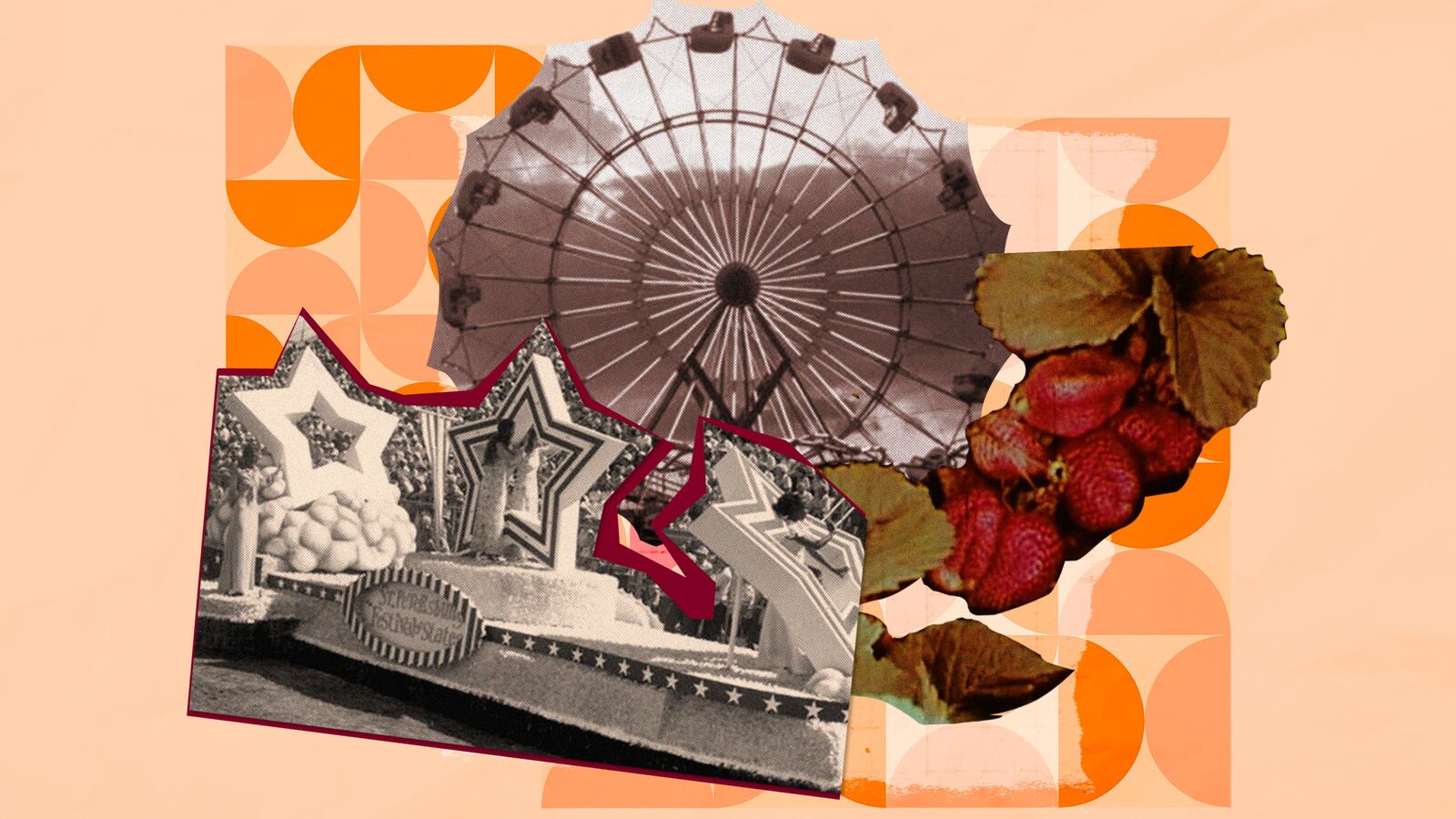One Saturday out of the blue my father announced that it was time for me to ride my bike downtown on my own. My mother was against it. My father spoke on behalf of children worldwide when he said, “Vicki, this is how they learn.”
He was in the front yard wearing tan pants, so he must have been on his way to work. I had my bike on the grass.
“This sidewalk will take you downtown,” he said, pointing at the thin strip of concrete in the grass.
It was a revelation of major import. I’d been downtown once, by car, with my mother to buy light bulbs at McCrory’s. I had never seen such a place. A lady in uniform was tending a popcorn machine. There were two aisles of toys, heavy on the pistols and light on the dolls. Balloons were strung over the lunch counter. I had heard at school that inside each balloon was a folded-up piece of paper scrawled with a number.
Places that good took a car ride to get to. I looked down at the crumble of concrete. “This sidewalk?” I asked.
“Stand here,” my father said.
I looked down the street as far as I could. The view revealed nothing. Ordinary houses lined the street. Oak trees dripped their mossy beards. A warm weight settled on my shoulder. My father’s hand. It stayed there as we both looked in the direction of downtown.
Dad told me a story. When he was my age, he had a lawn-mowing business. One day he got an idea. He was dirty from cutting grass and wanted a steak. He showered, put on his church suit, and called the only cab in Plant City. He told the driver to take him to Combs’ café downtown.
“I had a steak, the whole works,” he said, grinning proudly. “Well, I came up short when the check arrived, and there was cussing and hollering.”
Standing next to me on the sidewalk, he laughed, jingling the coins in his pocket.
The hook was in. I had to go downtown.
“You know to look both ways before you cross,” he said, holding on to my bike handle. “And when you see people, speak to them. This is your town.”
I was eager to get going, and then my mother came out on the front steps, probably trying to squash the trip.
“Can you pick up a stick of butter?” she called out.
“Ha ha,” I said. When I glanced back, she was in the doorway, watching me.
“Wait,” my father said. One arm disappeared behind him, reaching for his wallet. He pulled out a five-dollar bill, which I quickly snatched. He started saying something else, some final word of wisdom, but I was already pedaling.

No sooner had I become an independent voyager able to travel great distances on my own than the conventions of girlhood finally caught up to me.
The Girl Scouts met at the Brownie Hut in Plant City. I wanted a house like the Brownie Hut. It was made of logs and it had a fireplace and smelled of woodsmoke. The refrigerator was stocked with jugs of fruit punch and Girl Scout cookies, and inside the door was a bottle of Mylanta in case anyone got a sour stomach. What else did you need?
We weren’t allowed to go to the pond outside the Brownie Hut because of water moccasins. It added to our sense of adventure, knowing that a tangle of serpents was on the other side of the door as we stood to give the Pledge of Allegiance. My friend Dixie and I planned out which badges we wanted to earn for our sashes. We all brought in recipes from home and we mimeographed them and stapled them together. One girl brought a recipe for Dr Pepper cake, another brought “grandma’s peach pie,” and my contribution was a recipe for sukiyaki.
Dixie possessed a wide array of Brownie gear and accouterments. She came to meetings with an olive-green mess kit with a cup, plate, and spoon inside. Her pretend world had a wider range than mine. She raided her older sister’s closet for go-go boots and sequin tops to dress up as one of Dean Martin’s Golddigger dancers. Her sister went on to become the Plant City Strawberry Queen, high royalty in town. Her sister shared stories of getting her hair done at the Wig Box, where the curling irons plugged into the ceiling. Dixie didn’t consider herself Strawberry Queen material. Pork chops and caramel cake were too dear to her, but she basked in the glory of being kin to royalty.
Plant City had been struck by the tap-dancing craze. The hub of tap lessons was Jackie’s School of Dance. On the days I wasn’t at Gigi’s after school or at the Brownie Hut with Dixie, I was at Jackie’s. The studio was on the second floor of an old building on Reynolds Street downtown. The owner, Miss Jackie, had studied with a ballet company up North, and this created a waiting list with local mothers wanting their girls to “study” under Miss Jackie.
Every Tuesday afternoon, I trudged up the stairs carrying my tap shoes. Inside, a dozen eight-year-olds wearing rouge were already clicking around on the polished floor. I hated the sound; it made me anxious and rushed as I put on my shoes. My hair wasn’t long enough to put in a bun. For the next thirty minutes, I tried not to slip. I kept trying to make it to the strip of carpet that led to the bathroom. Nervous sweat burned through my leotard, making wet circles under my arms.
After my successful bike trip downtown, I wanted to ride my bike to Gladys Jeffcoat’s photography studio instead. Gladys specialized in family portraits, but her passion was photographing car wrecks. She had a police scanner and she often beat the Tampa Tribune or the Lakeland Ledger photographer to the scene. Clicking around on the floor seemed like a huge waste of time, and I was terrible at it. Then my father told me something important about Jackie’s School of Dance. He said Jackie’s School of Dance had a float in the grand parade during the Plant City Strawberry Festival and her girls rode on it. That was incentive enough to stay with tap. The parade was always on the first Monday in March. For two months we rehearsed in our clicking shoes and crafted wands out of Reynolds aluminum wrap and special-ordered leotards. In the event of a cold snap, we were to wear white or cream sweaters only.
Miss Jackie had instructed us to meet her at the JSOD float near Kilgore Seed and to arrive ready—hair, face, tights, the works. At home I’d stood in the bathroom stiff as a board while my mother dug around in her makeup drawers for lipstick and blush. She sat on the edge of the white claw-foot tub. Think of it as Halloween, she said, without the Pink Panther costume. She tried to keep a straight face as she applied my lipstick. I drew the line at eye shadow.

Miss Jackie assured us there would be room for our whole class on the float. That’s how good-hearted she was. She also knew the Darwinian frenzy that occurred when three dozen females in rouge stepped on a parade float. Nature would sort itself out.
School was canceled the day of the parade. Businesses were closed. My father had left the house early to attend the prayer breakfast for town leaders at First Baptist Church. Over eggs, bacon, biscuits, and watery coffee, the state agriculture commissioner promised a banner year for Florida citrus. The floats began streaming into town from the barns and pastures where they’d been decorated in secret. Seeing them for the first time was exciting. The churches roped pianos and organs on top of their floats; everyone else used canned music over tinny bullhorns. One of the car dealerships was already playing “A Boy Named Sue.”
Our float was midway back in the parade lineup. Miss Jackie always went all out. A crepe paper fringe swept the bottom of the float, like a hula skirt, and on top, big letters spelled out JSOD. About thirty of us climbed aboard and spread out. The prettiest girls jostled to get out front as the public face. I made a beeline for the anonymous middle. I didn’t want unknown masses in lawn chairs scrutinizing every inch of me. My preference was not to be seen at all. The prestige of riding on the float was good enough. I already had a small hole in my white tights from scrambling on board.
Our mandate was to tap-dance the entire one-mile parade route. Between the lipstick and the hair, we looked like pageant contestants eager for the runway. The exhaust from the idling engines made us glossy. Finally, it was time, and the floats began to roll.
Our first girl tapped off the edge of the float after a few blocks. We kept rolling until someone yelled at the driver and the float jerked to a halt. Miss Jackie came running over. The girl was fine. They brushed her off, redid her bun, and we got back into the flow.
We moved beneath archways of Spanish moss. People lined the streets. They tilted their faces up in benevolent appreciation. The Baptists sat together on one side of the street and the Methodists sat together on the other. They gave their full attention to each float. The stars of the parade were the Strawberry Queen and her court, five young women who were the most beautiful daughters of the town scions. The queen wore a three-pound silver crown. Men took off their hats and women beamed, imagining themselves on the float.
Cynicism had no place in their hearts. Unwrapping the wax paper from the sandwiches they brought from home, they did it without looking so they wouldn’t miss a second of the parade that only happened once a year, and though they had never missed a single one, this was the best one yet. The floats moved slowly. There was no hurry. Go on and make it last forever.
Excerpted from THROUGH THE GROVES: a memoir by Anne Hull. Published by Henry Holt and Company. Copyright © 2023 by Anne Hull. All rights reserved.







